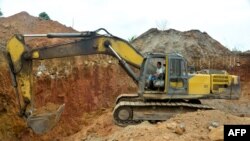The protests came in the wake of a government announcement earlier this month that Sinosteel Cam, a subsidiary of state-owed Chinese mining concern Sinosteel will develop the Lobe iron ore mine near the Atlantic coast.
Protest organizer Cabral Libii, opposition lawmaker and former candidate for president, said a Cameroonian company should have been given a license to explore and exploit the natural resource instead of a foreign company that has no interest in developing Cameroon and moving its citizens out of poverty.
Libii said there is nothing in the deal that compels the iron ore exploitation company to develop Lobe and Lolabe.
Cameroon says allegations by Libii that locals will not benefit from the project are unfounded.
Gabriel Dodo Ndoke, Cameroon’s mines minister, said Sinosteel Cam is expected to build schools, hospitals, roads and a 20-kilometer-long pipeline to move the ore from Lobe to the Atlantic port of Kribi.
Cameroon says allegations by Libii that locals will not benefit from the project are unfounded.
"It is a win-win mining convention that the state has signed," he said, adding "The Cameroon mining code provides for the payment of specific mining taxes for local development and the Sinosteel mining agreement took all these elements into account."
Along with boosting the nation's GDP, Ndoke asserts the project is expected to generate at least 600 direct jobs at the mine and 1,000 indirect jobs related to its operation.
Cameroonians and Chinese miners in the central African state have long had friction between them. Cameroonians accuse Chinese miners of violating Cameroonian laws, which prohibit mining on riverbeds, swampy areas and waterfalls.
Cameroonians also say the Chinese in eastern gold mines do not help to develop villages, pay workers less than $3 after 12 hours of work and do not respect environmental norms.
Economist Fred Duven, a member of Cameroonian civil society group Dynamique Citoyenne, says Cameroonians are angry over the government giving mining licenses to China when there are qualified Cameroonians ready to industrialize their country.
"Cameroonians who are worthy and wealthy can indulge into exploration business and can create greater employment than the direct employment the convention [mining agreement] is trying to purport," Duven said.
He asserts that "Chinese companies come here with their manpower; they don't help the community."





